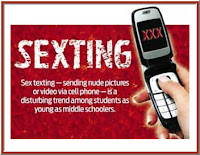 2-25-2010 Illinois:
2-25-2010 Illinois:
SPRINGFIELD, ILL. — Even for state lawmakers who have gotten used to confronting strange new societal issues spawned by technology — cyber stalking, Internet gambling, texting while driving — this one is daunting:
What do you do about the 14-year-old kid who gets caught snapping lewd images of herself with her cell phone and sending them to her boyfriend, ultimately risking a worldwide audience?
Illinois lawmakers are pondering how to address the issue of "sexting," or producing, sending or receiving sexually explicit imagery via cell phone or the Internet. Some data suggest that as many as 30 percent of teens who use cell phones engage in it. State law has no way to address it, short of charging the children involved (including the self-photographer) as child pornographers, which would require them to register as sex offenders.
Now Illinois proponents are calling for the creation of other legal options that would allow authorities to intervene without filing criminal charges against minors. Two measures under consideration in Springfield would provide legal power to force minors into counseling, community service and other responses short of incarceration if they engage in sexting.
"This is a calibrated response to a growing social problem," Matthew Jones, legislative liaison for the Illinois state's attorney's appellate prosecutor's office, told legislators in support of the more sweeping of the two measures. It would give courts the authority to order counseling and other responses toward all the minors involved, including the original self-photographer.
In Missouri, proposed restrictions on "sexting" were dropped from a crime bill late in the 2009 legislative session, and the issue hasn't been debated during this year's session.
Illinois apparently has never charged a "sexting" minor as a child pornographer, but other states have, and it remains an option for prosecutors under Illinois law. Jones described the current proposal as a way to intervene that won't "make these kids sex offenders for the rest of their lives."
"Right now, it's all or nothing," he said.
But some critics say that going after the kid who takes a photo, and the boyfriend or girlfriend who receives it but doesn't disseminate it, is unnecessary and possibly harmful. They argue that sex education and other approaches outside the court system are the proper response.
"It's a misdirection of our resources ... to bring in (to court) someone who took a photograph of themselves," argued Lyn Schollett of the Illinois Coalition Against Sexual Assault. That group, along with the American Civil Liberties Union, is supporting a different "sexting" measure that would only address those who disseminate the images to third parties, leaving the original producer and recipient out of it.
"This is a serious issue ... (but) the person who takes a picture of herself should not be brought into a police station," said Schollett.
The issue has highlighted a part of cyber culture — and youth culture — that has clearly shocked and baffled the generally middle-aged lawmakers studying the problem. When one critic referred to some "sexting" as merely "a Romeo-and-Juliet thing," state Sen. Bill Haine, D-Alton, responded, incredulously: "I don't remember that from Shakespeare!"
In the typical scenario, as laid out for lawmakers in two hearings Wednesday, a teenager takes nude or semi-nude photos of himself or herself with a cell phone camera, then transmits them to a girlfriend or boyfriend.
In a secondary result — which appears to be practically inevitable in the world of teenagers — friends or other minors obtain and disseminate the image among their peers, generally without the consent of the person who produced the picture.
"You have a photograph that lives forever," said Jones, of the appellate prosecutor's office. "They have this naked picture out there that has serious consequences" for employment and personal lives.
At least two teen suicides nationally have been blamed on sexting activities that got out of control in the past year. A dozen states around the U.S. are considering various ways of dealing with the issue, ranging from educational programs to criminalization. Kentucky is currently considering levying fines on teens caught sexting.
Tyler Burnett, a junior at O'Fallon (Ill.) Township High School, said sexting may be popular at some schools in some parts of the country but not O'Fallon. Burnett said he could not be sure it never happens but said he had not heard about it.
A girl who is also a junior at O'Fallon said she had not heard of sexting among students there, either.
The measure that would address all participants in sexting is SB2513. It passed the Senate Criminal Law Committee Wednesday and now moves to the full Senate. The bill to address only third-party disseminators of the images is HB4583, and is awaiting a vote in the House Juvenile Justice Reform Committee. ..Source.. Kevin McDermott
February 25, 2010
Illinois ponders ‘sexting’ trend
Subscribe to:
Post Comments (Atom)

No comments:
Post a Comment